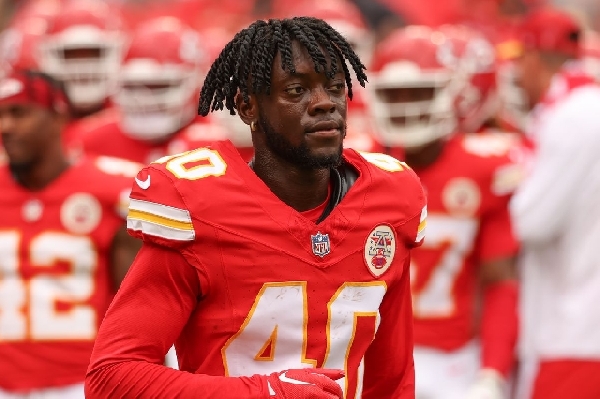“We really didn’t want him to play,” revealed Valentina Boye-Doe, Ekow’s mother, during an exclusive interview with 27 News in Las Vegas.
“The first time I saw football on TV, it was like, ‘What the heck?! What kind of game is this?'” she added.
Even Ekow’s older brothers, twins Panyin and Kakra, were forbidden from playing football when the Boye-Doe family, originally from Ghana in West Africa, moved to Lawrence, Kansas, in the United States.
Sports, especially American football, were not a part of their cultural background.
“The three principles in the house?
Education, education, education,” emphasised Valentina.
“In my family tree, we are engrossed in education,” added Kofi Boye-Doe, Ekow’s dad.
“If you ask anybody that knows me, they will say, ‘Boye-Doe is all about education.’ So, why would you play football?”
While Kakra pursued a career in medicine and Panyin in accountancy, Kofi had hoped Ekow would become a lawyer, completing a scholarly trio of sons.
“It would’ve completed my dream of bringing my kids to America,” Kofi said. “America is the land of opportunity… I wanted to experiment and see if I could get these kids to the level that I wanted to get to.”
However, Ekow had different aspirations.
His talent, noticed by his older brothers during neighborhood games, led to a persuasive sales pitch involving a next-door neighbour, a coach, and a fundraising campaign to get Ekow, affectionately called Pak, on the football field.
“Our neighbour, Christopher, he played football, so they tried to get Pak on the team,” explained Panyin.
“Ekow’s football coach Dave Conway… the Conway family is the reason why Ekow plays football,” added Kofi.
Despite reservations, the family supported Ekow’s football journey, with the twins undertaking a fundraising campaign by selling gift cards to various restaurants to cover the $200 registration fee for Lawrence football league.
Ekow’s path faced further challenges when he aspired to play Power Five football at the University of Kansas (KU) but did not receive the opportunity.
“He wanted to go to KU,” said Kofi, who had pleaded with KU coaches to consider Ekow.
Not highly recruited out of high school, Ekow made a name for himself over five seasons with Kansas State.
The challenges persisted on draft day in 2023, where the anticipated call or a free-agent contract did not materialise, leaving Ekow devastated.
“After the draft, I saw my son… he was so devastated,” recalled Valentina.
“I look at him and I’m like, ‘Okay son… what is the next step for plan B?’ He goes ‘FOOTBALL MOM.’”
Football remained Ekow’s unwavering passion.
The Kansas City Chiefs extended a rookie minicamp invitation, offering a temporary lifeline.
“Obviously that was an opportunity, but only two people who got invited got the contract, so the odds were stacked against him,” explained Panyin.
Despite initial setbacks, Ekow was released during the final preseason roster cuts but signed to the practice squad and later promoted to the Chiefs’ active roster in late November.
Now, Pak has a chance to become the fourth Ghanaian player to win a Super Bowl ring, a remarkable journey fueled by determination.
“It’s been a fun journey, but the cards were stacked against him. I don’t think he was supposed to be here,” remarked Panyin.
Ekow’s story, according to his older brother, symbolises resilience and hard work, offering inspiration worldwide.
“I think that Ekow playing in the Super Bowl is going to elevate this game worldwide… his story is a Cinderella story,” said Kofi.
He believes Ekow’s tale sends a universal message: “That story is remarkable, and it’s not only for Ekow and for Ghanaians and for people internationally. It’s also telling every young kid that whatever your talent is, if you work hard, you are going to be recognized.”
In summarising Ekow’s journey, Kofi used a repetitive list akin to the ‘education’ principles of their family: “Resilience, resilience, resilience, resilience.”

